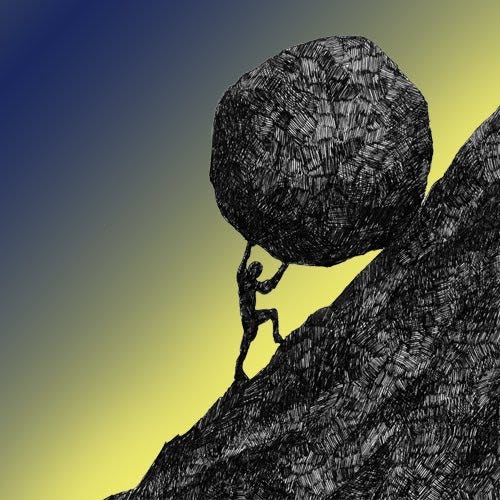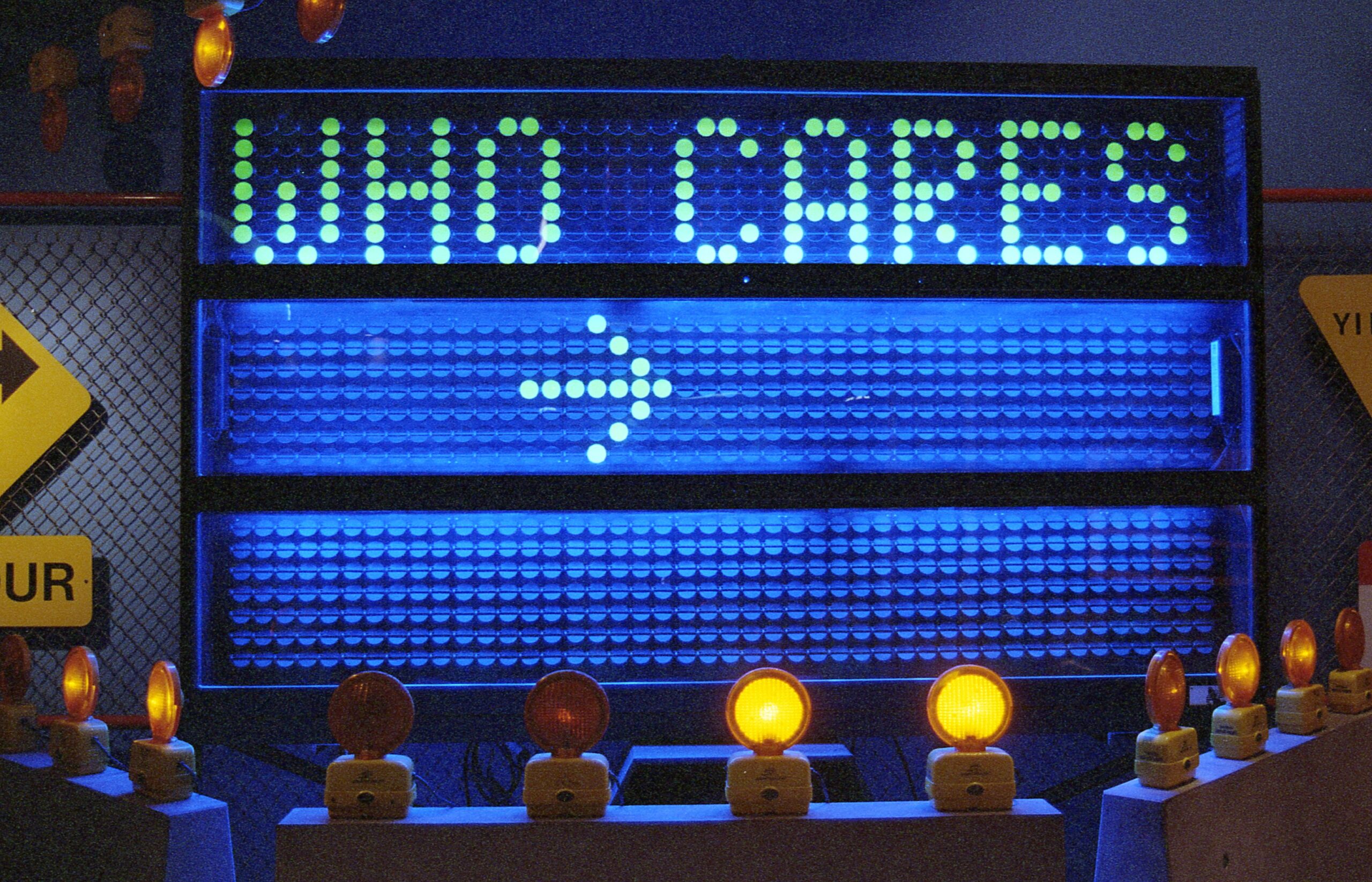
Leadership, Productivity, Well Being
The Next Time You’re Guilted into Saying Yes, Think About This
A lot of my coaching clients struggle with boundaries. I suppose it takes one to know one. Like any good co-dependent, it’s the area I’ve probably had to do the most work on. I’ve gotten considerably better at managing boundaries over the years, which has resulted in managing expectations with clients more effectively, as I’m much more upfront about what the role of a coach is and isn’t and have worked hard to not take responsibility for my coaching clients’ learning and growth. It’s improved family relationships and friendships, as I’ve gotten clearer on what healthy relationships look like, and as a result, no longer spend a lot of time obsessing about things or trying to control things that can’t be controlled. And then every once in a while, I get triggered. It’s inevitable; it happens to us all. And it happened to me the other day when I was asked by a colleague to help them out on something they need to learn to take responsibility for themselves. Normally I would have let the guilt push me into saying yes. But something interesting happened instead. I got visibly mad, and I found myself stomping around my office and complaining to my husband. I got mad because I value fairness and accountability and always strive to be the kind of person who takes her fair share of the load. I got even madder because I’ve noticed a pattern of this individual playing the victim and manipulating others in the spirit of “collaboration” to get them to step in on a moment’s notice and bail them out. I was mad at her, and I think I was also mad from a cumulative effect of this behavior – over the course of my career I’ve often felt obligated to step in and save the day for others who I have judged (rightly or wrongly) to be stupid, lazy, weak or selfish. I’ve felt like I had no choice but to help, and inadvertently built up a pool of smoldering resentment, as I erred to compromise myself and my values rather than risk being branded as unhelpful. Look under the guilt and anger, what’s the underlying need? Experience has taught me there’s normally something we need to look at within ourselves when we experience such a visceral reaction. And the interesting thing about anger is there’s normally something sitting under it that’s begging to be healed. So I looked. And then I looked some more. And then I realized what this was really about. It was really about approval. We often confuse manipulation with collaboration And then I remembered a 360 I had done a long time ago, a couple of years after I had moved into leadership development. My colleagues had provided anonymous feedback. Their perception of me wasn’t stellar – I was completely focused on task and results, with no room for relationship. And I prioritized my goals and deliverables above everything else. It was a blindspot. I was so desperate […]
July 10, 2024
|
5.2 min read

Emotional Intelligence, Leadership, Spirituality, Well Being
Want to feel more joyful? Think about this.
Our failure to know joy is a direct reflection of our inability to forgive. Charlotte Jojo Beck I came across this quote the other day and it caused me to really pause and think. As human beings, we tend to look at joy as something that’s attained once we’ve completed a series of steps. I see this a lot in my coaching practice. I’ll have joy when I get this promotion. I’ll be able to tap into joy when I no longer work for this horrible boss, or when I feel more confident in my skillset. I’ll have joy once I understand what my purpose and my true path on earth really is and have a plan for making it happen. It’s not wrong to seek change, to want to grow or to want to improve our circumstances. The problem is in thinking that “fix” alone will solve the problem of not having enough joy in our lives. Our mental construct often frames joy as something we must earn. The truth is joy is accessible now – in our imperfect lives, our imperfect careers, our imperfect leadership, our imperfect team and family dynamics. The issue is that we can’t often access it because we’re too busy blaming ourselves or others for the perceived problems in our lives. Forgiveness is often an inside job Beck’s quote speaks to the path we need to take to access what’s already available to us. And more often than not, the person we need to forgive the most is ourselves. Forgiveness is about letting go of the protective armor Or maybe anger and resentment is projected outwards at the people around us. We find ourselves locked into judgment and blame of others for the things they have done to us. The things we have been subjected to – unfair expectations, abuse, trauma, bad leadership, bullying, being taken advantage of. The list could go on and on. Perhaps it shows up as passive aggressiveness or full blown aggressiveness with others. Or maybe avoidance. Forgiveness begins with the intention to let go of the armor of blame and defensiveness and a willingness to touch the vulnerability that sits underneath the anger. Perhaps it’s the shame of having been humiliated publicly. Or of having been abandoned and feeling isolated and unwanted. Or the regret and shame of not standing up for ourselves with a difficult person. When we can face that vulnerability and meet it with compassion and love for ourselves, we find ourselves on a much more joyful path. For a long time, I carried a lot of anger and resentment about a previous work situation. It was years ago, when I had just transitioned my career, and found myself in a situation where I had been set up to fail. It wasn’t until I really leaned into the feeling that was sitting under the anger – humiliation, and allowed myself to feel it without trying to push it away, that I could let it go. […]
June 20, 2024
|
4.4 min read

Authenticity, Mindfulness, Well Being
Be Careful Who You Put on a Pedestal
The last few weeks have been interesting ones – for a good chunk of March my husband and I took a vacation with my parents to Africa to go on safari. I’ve been in a reflective place since then, thinking about the fun and excitement of the trip, but also thinking about how far I’ve come in my relationship with my parents, particularly with my father. Family relationships can be tough, especially parent – child ones, and then there’s the added aspect of how we as children tend to put our parents on a pedestal. It’s hard not to, when you think about it. I’ve lived it, many of my clients have lived it, and while well intended, there are several unintended consequences in doing so. It manifests in a lack of decisiveness when it comes to things like career choices, life choices, increases codependency and can really muddy the waters where clear thinking is concerned. When I think about the impact this had on my life, it’s profound. It’s hard to just “be,” when you’re so busy trying to be someone else’s version of you. Inadvertently and unconsciously, we give our power away and when we do we grow increasingly resentful of the other person. Why can’t he see me for who I am? Why can’t he appreciate me for the person I’ve become? We feel pushed or compelled to do things out of family obligation and anger and resentment builds and builds. Left unchecked it can completely poison the relationship. I thank God it didn’t in the case of me and my dad. When I truly think about it, for many years I was playing the part of the victim who had to do what he said without any choice in the matter, and my dad was the persecutor in our dynamic. The more the anger built, the more I distanced myself from him – my tactic was to isolate myself rather than fight. Over the years I’ve worked hard to pull him down from the pedestal I created. And it’s important to note that I was the one that created it. Pedestals keep us from being able to truly love Putting others on a pedestal isn’t fair in two ways. It’s not fair to yourself, because in effect what you’re doing is giving your power away as you seek approval and validation from the person on the pedestal. But it’s also not fair to the other person. It puts pressure on them, it creates unrealistic expectations that they need to live up to. It creates a sense of division, of separation. And the greater that sense of separation, the harder it is for love to enter the equation. The harder it is to see that person for the truth of who they really are – a flawed, messy, beautiful human being, doing their best, worthy of unconditional love all the same. That’s how I see my Dad now. And I appreciate him for who he is, just […]
April 3, 2024
|
6.3 min read

Emotional Intelligence, Mindfulness, Well Being
Pain is Inevitable, Suffering is Optional
The title of today’s blog is a quote that has been attributed to many notable talking heads, including the Dali Lama. And it’s the events of last week that really brought it home for me, as in the wee hours of Friday morning, when I should have been peacefully sleeping, I was awakened by a massive migraine attack, complete with nausea and all the fun things a migraine can throw one’s way. The bottom line – it was an unrelenting 24 hours of hell. And not just on the physical front. Especially not only on the physical front. In-between unsteady trips to the bathroom my mind was awash with anxiety. What’s going to happen to all my client appointments tomorrow? Cancelled. What’s going to happen to my blog I need to finish and get out by the end of the week? Not happening. What if this wrecks my business? Clients are going to think I’m unreliable. How am I supposed to plan and manage my engagements when something like this can strike without a moment’s notice? What if this puts undue stain on my marriage? Me being up keeps him up. How much can my husband really take? It left me drained, emotionally and physically, but also quite reflective. Because at some point, in the midst of all the strife, strain and obsessive worrying, I realized I had a choice. Not a choice of whether I get to have migraines – unfortunately I don’t have that kind of power! But a choice on what perspective I get to take on the situation. And it’s the perspective I take that leads directly to how much suffering I must endure. What does it mean to suffer? To break this down, let’s think about what suffering means. It’s worth noodling on this considering the Buddha said many a time that “life is suffering.” On the surface of it, not the most upbeat way to view our journey around planet earth. But it depends on how you look at it. I’ve often defined suffering as “resistance to what is.” Resistance creates pressure. And pressure creates stress. And so, when folks enter my virtual office these days and say things like they’re burned out and stressed out, I believe them. They are. But I also say the solution lies not so much in having more time in the day to address a never-ending list of to-dos, but more in the way we manage our energy relative to the problems life throws our way. Because unfortunately, like it or not, life will throw us problems. That’s the one thing we can always count on. The real problem is we think we shouldn’t have problems. And therefore, we spend a lot of time resisting said problems, which creates a lot of suffering. Recognize any of these? If only I’d had a better childhood, then I wouldn’t be navigating all the difficulty I am right now. They were wrong to fire me. If they had really valued me, […]
February 26, 2024
|
5.5 min read

Emotional Intelligence, Leadership, Spirituality, Well Being
An antidote for impostor syndrome – but it’s not quite what you think
Impostor syndrome is one of those interesting and universal things – in my opinion we all suffer from it. It shows up in many ways – failure to try new things because we’re afraid we’re going to fail, we don’t speak up in a meeting and so we never get credit for the idea, we don’t ask for the promotion, we don’t ask for help, we avoid asking for feedback or we over defend if we do get it, we overwork something to death because it’s not quite perfect yet, we fail to advocate for ourselves… We all suffer silently and repeat the same patterns I could go on and on. And we’re somewhat aware of the cost of this, as it makes life a lot more painful to live. We KNOW in our heads that we suffer from impostor syndrome. We might read books on it, we’ve taken the online quiz, maybe even our therapist told us. So we look for new techniques on how to solve this problem, we look to apply a new perspective and think carefully about what the morning affirmation needs to say (that is, if we remember to do it.). Maybe we practice meditation hoping and praying it will disappear, or we call our doctor and ask for a prescription for the daily anxiety we’re battling and just can’t seem to shake no matter how successful we are, no matter how many things get ticked off the to do list. Because there’s always more. We practice self-care because that’s the solution, right? A massage, getting the nails done, we tell ourselves that we need to be kinder to ourselves. But deep down we KNOW we don’t deserve it. Our nails look great and inside we’re still a mess. And we go about our business of repeating the same cycles, the same patterns of suffering, because obviously there’s no real fix to this, otherwise somebody would have figured it out by now. Impostor syndrome can’t be solved by the same thinking that creates it There is a fix. The problem is we’re often looking in the wrong place. Impostor syndrome can’t be solved by the same problem that creates it. It’s not a thinking problem. It can’t be solved in the head. It can only be solved in the heart. The heart – an interesting concept for many of us to take in. It’s a place many of us aren’t super familiar with and frankly don’t have much experience with. And yet we all have one. How does this happen and how can this be? Because adulthood often entails learning how not to feel things. Learning how to hide things. Learning how to cope with the difficulties of life, and feelings will just get in the way and get us in trouble. We learn early on as children that feelings are often scary and if we express them, we’ll probably get punished, or worse. We learn how to not take emotions to work because emotional […]
October 17, 2023
|
5.7 min read

Career Coaching, Mindfulness, Motivation, Well Being
Is the Trick in Life Not to Care? Kind of…
We tend to focus a lot on outcomes in our society. Outcomes are how we evaluate success. That project didn’t achieve the stated outcome, so we brand it as a failure. The business is no longer a going concern, so it’s a bust. Maybe we don’t get the promotion we were longing for, or a particular dream job, and we make ourselves miserable thinking about what could have been. What should have been. Focusing solely on outcomes is a recipe for misery I realize this headline may sound ironic coming from a woman who in a former career was responsible for pulling together performance dashboards and kpi updates, but I’ve found it to be true. For many of us it would behoove us to embrace the Buddhist concept of non-attachment. Which isn’t the same as not caring or becoming apathetic. Let me share an example of what I mean by this. I love what I do as a career and leadership coach and facilitator. In many ways I look at it as a vocation, rather than a job. I’m deeply attached to the purpose of enabling and helping others to be effective and to develop clarity of purpose, compassion for self and others and confidence. But my work in this space can feel like heaven, or it can also feel like hell. And a lot of the difference has to do with how attached I am to certain outcomes. Any job can be heaven or hell Take career coaching for instance – there have been occasions when I’ve been sucked into my client’s outcome, that attachment to finding the perfect job or the perfect career (even though I emphatically assert there is no perfect job or career!). I become aware of when that happens because I start noticing a few things. I start worrying more than usual about my client interactions. I worry they’re not getting enough out of the coaching process, or what they would say about me as their coach. I start to worry about my reputation and whether I’ll get a bad review. If it gets extreme, I start judging myself – maybe I should have suggested this or that. I even start questioning my credibility as a coach. And when that happens, I find myself violating my own rules as a coach, because I move from curiosity and inquiry into tell mode. I lose sight of the fact that my role as a coach is to facilitate the process and instead try to drive the outcome. In essence, I get overly attached to the client’s outcome and as a result make myself miserable and drive myself crazy. When I practice non-attachment that same interaction can look and feels very different. The reason it feels so different is because I’m not attached to the outcome, and if I’m not attached to the outcome I can rest fully in the present moment. I’m not worrying about the question I just asked and whether it was good enough. I’m […]
September 28, 2023
|
4.6 min read
Well Being
Shelley Pernot, otherwise known as the Irreverent Guru of Mindfulness, muses on life, leadership and everything in between. Your one stop shop for career tips, leadership tips and daily inspiration!

It was a privilege to work with Shelley as my leadership coach! The process was structured and yet flexible enough to meet needs as they arose. Shelley helped me to grow, learn more about myself, and to really achieve what I set out to accomplish. We worked on planning, navigating a promotion successfully, and so much more! I experienced many successes as a result of working with Shelley, she has great resources, knowledge, and really helps with setting the foundation to this coaching work. She won’t let you down!
Stacy Campos
Regional Coordinator
Having the opportunity to have Shelley as my Leadership Coach could not have come at a better time in my career. I was recently promoted to CFO and was new to the Senior Management Team. Shelley helped me navigate joining the team as well as helped me to determine who I wanted to be as a leader. The Leadership Circle Profile helped our team to discover our blinds spots and to be able to understand each other better. Working with Shelley not only has affected my professional life in a positive way, but also my personal life. She helped me take leaps and has given me the resources to continue this journey of self-improvement. If you’re looking to find more about yourself and how you can be the best version of yourself, I highly recommend working with Shelley.
Kristen Spedale
CFO
I have been working with Shelley for the past 2 years on my leadership development journey. What I thought would be a straight line, I soon learned with Shelley’s guidance, was a winding path with several ups and downs along the way. Shelley supported me as I took a deep dive into my professional and personal history and learned how it affects my approach and my perceptions. She helped me to slow down and recognize certain behaviors and understand that I can pivot in the moment or try again next time. Ultimately, my work with Shelley turned out to be so much more than what I expected. Her approach to coaching was exactly what I needed.
Nicole Naassan
Senior Vice President, Consulting
I’ve learned more about leadership in the past six months working with Shelley than I have in my 10+ year career. She is an incredible coach with many tools in her toolbox. The guidance and mentorship I’ve received from Shelley has been life-changing. She will challenge your limiting beliefs and inspire new ways of thinking.
Margaret Soltis
Creative Director
I highly recommend Shelley if you need a coach, thought partner, and guide as you consider the next steps in your career. She provides practical tools and advice to help launch your career exploration, but most importantly, she is an expert at helping you cut through the noise of your limiting beliefs. At the end of our time together, I had a much clearer vision of what I wanted in my life and a plan to make it happen. My only regret is that I didn’t find her sooner!
Elizabeth Magnus
My career coaching sessions with Shelley have brought me back to living. It’s been contagious, spreading throughout my personal and professional life. I now have the building blocks I need to continue setting healthy boundaries, the freedom to show up as my authentic self, and an adaption of a growth mindset that has allowed me to make bold decisions and try new things. I’ve discovered that there’s always another way and how to eradicate barriers that lead to tunnel vision. These sessions with Shelley have been a great gift and have given me the momentum I need to continue the journey to be my best self.
Teasha Houston
Art Director
It is amazing to think where I was only 10 months ago when I first started working with Shelley and where I am now. Not only professionally but mentally and emotionally. Shelley helped me navigate out of an unhealthy work environment by challenging me and asking me those tough questions we never seem to ask ourselves. What are the values of a true leader? How do those values align with my own? Shelley challenging me and guiding me through some of those tough questions is what led to my epiphany and me having the courage and confidence to leave an environment that threatened my well-being. She taught me how to become more self-aware and self-compassionate. Reminded me to be kind even when the world would understand if I did otherwise. And the biggest one for me, shutting down that crazy inner voice (we all have it!) and replacing it with being present. Shelley has armed me with tools that I will carry with me for a lifetime. Tools that will help me to continue to grow and learn. Life can be hard but working with someone like Shelley does make it easier. She will help you navigate the good and the bad and you’ll learn so much about yourself in the process.
Michele Feria
Director of Marketing
First of all I would like to say that I would recommend Shelley to anyone needing career guidance. As my counselor Shelley helped me transition my career from bartending to Tech Sales which was a difficult and scary transition for me. From the start Shelley was fantastic. Initially I had no idea of which direction I wanted my career to go, I just knew I wanted it to go somewhere else. Shelley was so kind and patient as she helped me figure this out, and gave me a step by step guide on how to explore my options and make an educated decision. She also helped me assess my skill set which played a large part in directing my energy. I landed a great job within days of my final session with Shelley, and now I’m month 3 I am absolutely loving it and doing very well. It was the perfect job for me and Shelley was the one that got me there. Working with Shelley was one of the best decisions I have ever made, she literally changed my life and I am so much happier for it.
Russell Boxer
Account Executive
